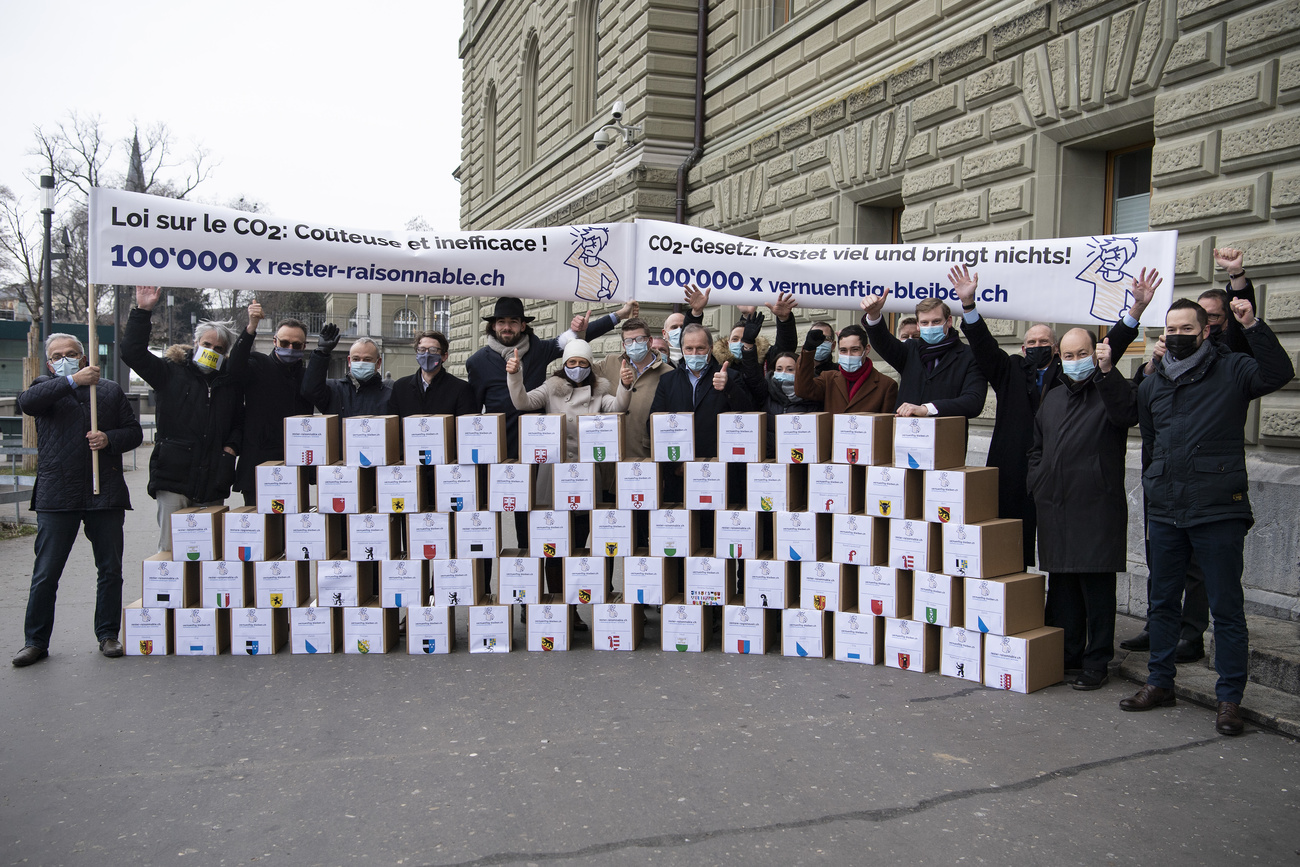Swiss CO2 law defeated at the ballot box

Switzerland’s strategy to abide by the Paris Agreement on Climate Change has hit a roadblock with a narrow majority of voters rejecting a law to curb greenhouse gases. The CO2 law was rejected on Sunday by 51.6% of voters.
The negative outcome represents a major upset for a country that is disproportionately affected by climate change. Switzerland’s temperatures are rising at about twice the pace of the global average and its Alpine glaciers risk disappearing by the end of the century.
“The “No” has repercussions,” said Environment Minister Simonetta Sommaruga. “It will now be difficult to achieve the climate targets.”
But Switzerland is not leaving the Paris agreement, she said.
The result bucks the political trend in Switzerland where the Green Party has gained ground much like in other parts of Europe. Two other initiatives driven by environmental concerns were also defeated on Sunday under the country’s system of direct democracy.
“The oil and gas companies and their lobby… have won,” the Green Party wrote in a statement. “This massively slows down climate protection.”
The CO2 law, which was based on the “polluter pays” principle, was the result of a broad compromise and a long battle in parliament. Initial opinion polls suggested the CO2 law had strong popular support (60%), but the “No” camp gained significant ground in the final weeks ahead of the vote.
Urban cantons including Basel, Zurich and Geneva voted in favour of the bill. But 21 of the 26 Swiss cantons struck it down.
The financial arguments put forward by opponents of the law are credited with turning the tables in a period marked by the coronavirus crisis. The emotional debate over anti-pesticide initiatives may have diverted attention away from climate considerations, observers say.
The economic committee “No to the CO2 law” expressed its delight at the result. “A yes to this misguided law would have resulted in a massive additional financial burden for the population and an immense increase in bureaucracy,” the committee said in a statement.
Supporters of the bill lamented a “black day for climate protection”.
A tough sell
In line with the Paris accord, Switzerland aims to be climate neutral by 2050. But how to best achieve that has been hotly debated. As a first step, the country’s CO2 law was revamped in a bid to reduce the nation’s greenhouse emissions to 50% of 1990 levels by 2030. Without it, Switzerland’s chances of meeting such goals are in doubt.
The government strategy had won the support of all political parties except for the right-wing People’s Party. The CO2 law envisioned various measures targeting road vehicles, air traffic, industrial emissions, and the renovation of buildings. Those who cut their CO2 emissions would have benefited from exemptions.
The aim was to curb the negative effects of climate change “without penalising the population or companies”.
But not everyone was convinced and opponents succeeded in collecting enough signatures to trigger a referendum on the issue. Critics included the oil lobby, homeowners, car associations, and GastroSuisse, the catering industry’s umbrella organisation. They viewed the additional taxes as too expensive and unfair as part of the population has no choice but to use a car.
+ The CO2 law won’t save the glaciers
While they recognized the reality of climate change, they questioned whether the CO2 law was the most appropriate means to mitigate its impact. They also argued that Switzerland will not make a critical difference to global climate efforts since the real game-changers are China and the United States when it comes to reducing CO2 emissions.
Some climate activists had also rejected the law, arguing it did not go far enough.
Climate strategy at stake
Supporters of the law saw a call to action in Switzerland’s melting glaciers, higher frequency of heatwaves and droughts, and the growing intensity of natural disasters. They believed the law would make climate-friendly alternatives in the transport and construction sectors more competitive and generate jobs.
“We are risking years of climate policy stasis without the new CO2 Act,” warned backers of the law including swisscleantech, Swissmem, the Swiss Association of Cities and the Climate Alliance.
During the referendum campaign, 160 Swiss parliamentarians stood together for a “Yes” vote, saying the CO2 law was “feasible, reasonable, and necessary.” More than 90 civil society organisations and 200 companies also campaigned in favour of the law. For the supporters, the bill was a “good compromise” after a tough parliamentary debate.
Switzerland’s major parties expressed disappointment at the outcome.
“Arguments about the costs for households have obviously weighed in the balance,” according to Cristina Gaggini of the Swiss Business Federation (economiesuisse). She says more emphasis should be placed on incentives in future, rather than increasing the CO2 tax.
Sommaruga said she would work with parliament to identify which elements of the law remained viable. The minister also announced that the government will soon pass a bill on the expansion of renewable energies.
Reducing fossil fuel emissions (CO2 law) 48.4% yes 51.6% no
‘Drinking water’ initiative 39.3% yes 60.7% no
‘Anti-pesticide’ initiative 39.4% yes 60.6% no
Preventing extremism (Anti-terrorism law) 56.6% yes 43.4% no
Government pandemic policy (Covid-19 law) 60.2% yes 39.8% no
Turnout: 59.7%
About 5.5 million Swiss citizens, including registered expat Swiss, were eligible to take part in the votes.
There were also additional ballots in 12 of the country’s 26 cantons and at local levels on June 13.

In compliance with the JTI standards
More: SWI swissinfo.ch certified by the Journalism Trust Initiative





You can find an overview of ongoing debates with our journalists here. Please join us!
If you want to start a conversation about a topic raised in this article or want to report factual errors, email us at english@swissinfo.ch.